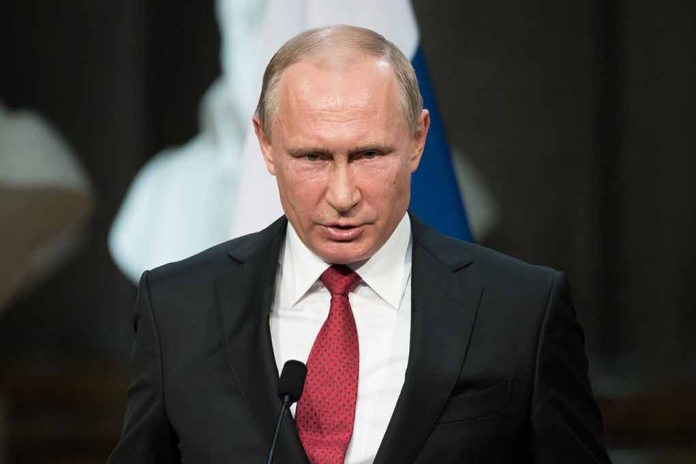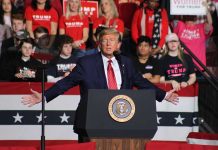
Vladimir Putin’s latest accusations against the West raise concerns over the autonomy of journalism amidst geopolitical tensions.
At a Glance
- President Vladimir Putin accused the West of persecuting Russian journalists.
- Moscow banned entry to Russia for 92 US citizens in response to perceived anti-Russian policies.
- The Kremlin has suppressed independent media since the invasion of Ukraine in 2022.
- Putin claims Russian journalists face direct censorship in Western countries.
- Putin’s accusations correlate with the first anniversary of Russia’s invasion of Ukraine.
Putin’s Accusations of Media Persecution
President Vladimir Putin has accused Western nations of systematically targeting Russian journalists, alleging that this fits into a broader scheme to quash dissenting perspectives and dominate the storytelling space. Putin claimed that Western countries are persecuting Russian correspondents to hide from inconvenient facts and truthful information.
He stated, “In order to hide from inconvenient facts, from truthful information, the West, which considers itself the standard of freedom, has launched an open persecution against Russian correspondents.”
Moscow recently banned entry to Russia for 92 US citizens, including journalists, in response to what it terms Washington’s Russophobic stance. The Kremlin has justified these bans as reciprocal measures against the restrictive laws and biased journalism that it claims endanger journalistic freedom and fairness.
Western Restrictions and Censorship Claims
Putin emphasized that Russian media are inherently free, provided they comply with Russian legislation. “The only requirement for them is compliance with Russian legislation,” he stated. The Kremlin has a history of suppressing independent media and blocking dissenting voices, especially since the invasion of Ukraine in 2022. Russian journalists face what Putin calls “direct censorship” in almost all Western countries.
The Russian government has accused Western countries of imposing unfair restrictions on its media, including bans on state-backed news outlets. In May, Russian lawmakers passed a bill allowing prosecutors to shut down foreign media bureaus in Moscow if Western countries are deemed “unfriendly” to Russian media.
Geopolitical Tensions and Accusations
Besides targeting journalists, Putin accused the West of seeking to “dismember” Russia into weak mini-states. He claimed that US and NATO allies aim to inflict a strategic defeat on Russia and make its people suffer. “In an interview with the state TV channel Rossiya on Sunday, Putin claimed the US and its Nato allies wanted to ‘inflict a strategic defeat on us’. The aim, he said, was to ‘make our people suffer’, adding: ‘How can we ignore their nuclear capabilities in these conditions?'”
Putin emphasized that these alleged Western plots have longstanding historical roots, dating back to the collapse of the USSR. His comments appear to aim at boosting public support for the ongoing war by framing it as a defensive struggle for national survival.
Military Context and Consequences
These accusations coincided with the first anniversary of Russia’s invasion of Ukraine. Russian troops have made local gains in Ukraine’s east but have not achieved a major breakthrough. The primary military focus remains on capturing the Donbas region, with significant fighting around the city of Bakhmut. Ukraine’s strategy involves holding the line in Donbas and launching a counteroffensive with newly acquired Western military hardware.
Volodymyr Zelenskyy, Ukraine’s President, reaffirmed his commitment to reclaim all Ukrainian territory, including Crimea. He posted photos of a pro-Ukrainian demonstration in Crimea from nine years ago and stated, “Nine years ago, Russian aggression began in Crimea. By returning Crimea, we will restore peace. This is our land. Our people. Our history. We will return the Ukrainian flag to every corner of Ukraine.”
Germany’s defense minister, Boris Pistorius, echoed support for the return of Crimea to Ukraine. He stated it is up to Kyiv to decide when and under what conditions to hold talks with Moscow. Zelenskiy has insisted on no negotiations until Russian troops fully withdraw.







